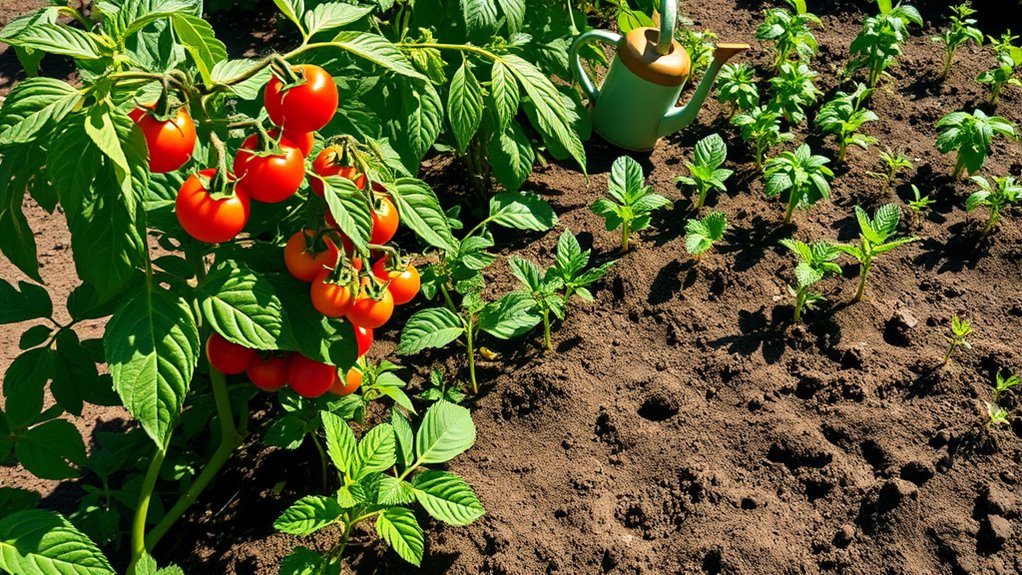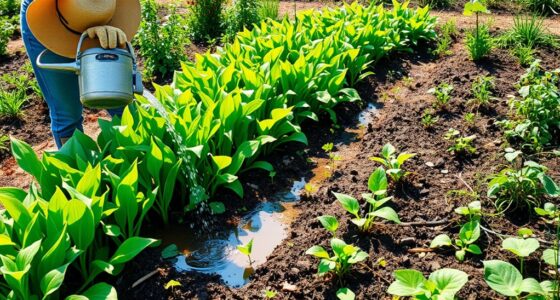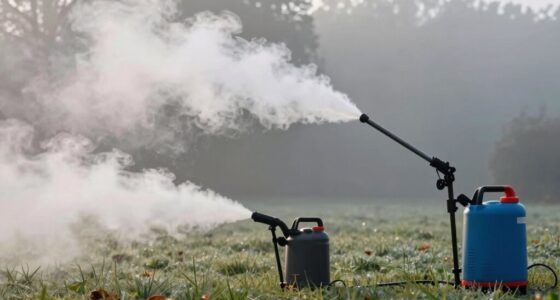To avoid common gardening mistakes, start by testing and preparing your soil with compost to guarantee good drainage and nutrients, rather than rushing into planting. Keep an eye out for pests early and use integrated management instead of relying only on chemicals. Plan carefully by considering sunlight, water, and plant compatibility, and follow proper planting techniques to promote healthy roots. Regular maintenance and monitoring prevent issues from becoming serious. If you stay mindful of these steps, you’ll set yourself up for a successful garden journey.
Key Takeaways
- Skipping soil testing or neglecting soil preparation can lead to poor plant growth and low yields.
- Ignoring pest signs or delaying control measures allows infestations to become severe.
- Planting without understanding sunlight, water needs, or compatibility hampers plant health.
- Rushing into planting without proper planning or soil checks increases the risk of failure.
- Failing to monitor and maintain the garden regularly can cause nutrient deficiencies and pest outbreaks.

Starting a garden can be exciting, but beginners often make common mistakes that hinder their success. One of the most critical early steps is soil preparation. If you skip this stage or rush through it, your plants might struggle to grow strong roots and access the nutrients they need. Instead of planting directly into the ground without checking its condition, take the time to test your soil’s pH and nutrient levels. Adding compost or organic matter can significantly improve soil structure, drainage, and fertility. When you neglect proper soil preparation, you risk planting in soil that’s either too compacted or too depleted, leading to weak plants and poor yields.
Another mistake beginners make is not paying enough attention to pest management early on. While pests are inevitable, ignoring their presence or waiting until an infestation becomes severe can ruin your garden. You should regularly inspect your plants for signs of pests like aphids, beetles, or caterpillars. Implementing integrated pest management (IPM) strategies—such as introducing beneficial insects, using organic deterrents, or physically removing pests—helps keep their numbers under control without harming the environment. Relying solely on chemical pesticides can be harmful and often unnecessary if you catch problems early. Proper pest management not only protects your plants but also promotes a balanced ecosystem in your garden.
Many beginners also underestimate the importance of planning before planting. It’s tempting to dig holes and start sowing seeds immediately, but without understanding your garden’s sunlight exposure, water availability, and plant compatibility, your efforts can go to waste. Proper soil preparation ties into this planning, as it ensures your plants will have a healthy foundation to thrive. Taking a few extra moments to research which plants grow best in your climate and soil conditions can save you a lot of frustration later. Additionally, understanding pest management techniques early on helps you prevent outbreaks rather than fight them after they’ve taken hold.
Frequently Asked Questions
How Often Should I Water My New Garden Plants?
You should water your new garden plants based on their watering schedule and plant hydration needs. Typically, aim to water deeply about once or twice a week, adjusting for weather conditions like heat or rain. Keep the soil moist but not soaked, ensuring your plants get enough water without overdoing it. Monitoring soil moisture helps maintain proper plant hydration, promoting healthy growth and preventing common issues like root rot.
Which Are the Easiest Plants for Beginners to Grow?
For beginner gardening, you want easy plants that thrive with minimal fuss. Opt for herbs like basil and mint, which grow quickly and require little care. Leafy greens such as lettuce and spinach are also great choices, as they’re forgiving and grow fast. Flowers like marigolds and sunflowers are simple to maintain and add color. These easy plants help new gardeners build confidence and enjoy gardening without feeling overwhelmed.
How Can I Prevent Pests Without Using Chemicals?
To prevent pests without chemicals, you can attract beneficial insects like ladybugs and lacewings by planting nectar-rich flowers nearby. Use organic traps such as sticky traps or beer traps to catch pests early. Regularly inspect your plants, remove damaged leaves, and encourage healthy growth. These natural methods create a balanced ecosystem, reducing pest populations while keeping your garden safe and chemical-free.
What’s the Best Time of Year to Start Gardening?
You should start gardening based on your local climate and the gardening calendar. Typically, spring is ideal for seasonal planting, as soil warms up and frost risk diminishes. Check your region’s planting schedule and consider your first frost date. Starting at the right time guarantees your plants get the best growing conditions, giving you a successful garden from the very beginning.
How Do I Improve Soil Quality Naturally?
To improve your soil quality naturally, start by testing your soil using simple soil testing methods to identify nutrient deficiencies. Incorporate composting techniques like adding organic matter, kitchen scraps, and mulch to enrich the soil. Regularly aerate and avoid chemical fertilizers, opting for natural amendments. This approach boosts soil fertility, improves structure, and supports healthy plant growth without harming the environment.
Conclusion
Avoiding these common gardening mistakes is like steering a ship through calm waters—you’ll enjoy a smoother, more successful journey. Remember to start small, be patient, and learn as you go. Each mistake is just a bump in the road, not a dead end. With a little care and attention, your garden will flourish like a vibrant, thriving rainforest. Keep your enthusiasm high, and soon, you’ll be harvesting the rewards of your hard work.









